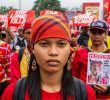“We were surprised to learn the details,” a nun who requested anonymity reacted. She added that rights abuses have been happening in Mindanao, yet, “all the while, President Aquino’s been informing the Manila people that there were no human rights violations in Mindanao.”
By ALEX D. LOPEZ
Davao Today
MANILA, Philippines – Benedictine nuns took the cudgels of Lumad leaders who were here in Manila to press for an end in the spate of human rights abuses in their communities.
“Through prayer and other means,” Sister Lydia Villegas, the Sub-Prioress of the Missionary Benedictine Sisters, said they expressed support to the struggle of the delegates of ‘Manilakbayan,’ a People’s Mobilization for the Defense of Land, Environment and Human Rights.
As a gesture of their sincere concern to the plight of the people in Mindanao, the congregation turned-over 70 packages filled with assorted food items, rice and canned goods.
Reports astounded the Benedictine nuns especially when details of the brutal Tampakan massacre were presented to them by Erita Capion, sister-in-law of Juvy Capion who was killed by the military’s 27th Infantry Battalion in Davao del Sur together with her two young sons.
“We were surprised to learn the details,” a nun who requested anonymity reacted. She added that rights abuses have been happening in Mindanao, yet, “all the while, President Aquino’s been informing the public that there were no human rights violations in Mindanao.”
“These tales are for real,” the nun said, adding that she would relate the story to the community where she is assigned. “People must be informed of what is happening in Mindanao,” she added.
During the meeting with the delegates, Lumad leaders took turns to recount their tale of despair and appeal for help.
“Members of the Armed Forces of the Philippines (AFP) wanted to stay in our community but we refused,” said Bai Bibiyaon Licayan Bigkay, a tribal leader from Natulinan, Talaingod town in Davao del Norte.
Bigkay added the military started to harass community leaders when they opposed the AFP’s entry in their village.
Aida Seisa, a lumad and secretary general of peasant group Kilusang Magbubukid ng Pilipinas in Southern Mindanao, said military presence has affected the students in their area.
“Naay mga bata nga wala na gyud nag-eskwela tungod sa kahadlok nga sudlon ang ilang barangay sa mga sundalo (There are children who really refused to go back to school out of fear that the military might invade their village.)”
Threats of the military and the entry of large-scale mining, according to Seisa, have put the lives of the indigenous peoples and peasant leaders in peril, even violating their right to a peaceful abode.
“Military presence is a prelude to the entry of large-scale mining,” Bigkay said in vernacular as she noted that they are aware of the plans of a foreign-owned mining company who wanted to operate in their ancestral lands.
“Large-scale mining will displace my tribe from our ancestral lands,” she said, adding that, “But we vow to oppose it.”
The story of the struggle of the people in Bukidnon against the construction of the mega-dam project was also tackled.
Datu Jomorito Goaynon, chair of the Panaglambigitay sa Nagkalain-laing Tribu sa Northern Mindanao, said the government is now using its forces to pressure tribal leaders especially those who oppose the project.
“Daghan na ang gipanghulga nga mga lideres, ang uban gihaylo sa military nga mouban kanila og gipangtagaan pud ug armas (Many leaders were threatened while others were lured to join the military and were armed),” Goaynon pointed out.
Goaynon added that the problem of lumads who were armed by the military is that they are being utilized in the counter-insurgency campaign and are also used to harass lumad communities who are against the construction of the mega-dam project.
“The lives of leaders and environmental defenders in the area are in danger,” he added citing the killing of Margarito Cabal last May.
Cabal’s widow, Rosalie, has asked the religious group to help seek justice to the death of her husband.
“Hangtud karon wala pa’y hustisya ang kamatayon sa akong bana, gipatay siya tungod sa iyang pagbarug nga dili tukuron ang mega-dam nga moapekto sa liboan ka mga residente sa Bukidnon ug Cotabato (Until now justice remains elusive for the death of my husband. He was murdered because he fought against the construction of the megadam project which will affect thousands of residents in Bukidnon and Cotabato provinces),” Rosalie said. (Alex D. Lopez/davaotoday.com)










